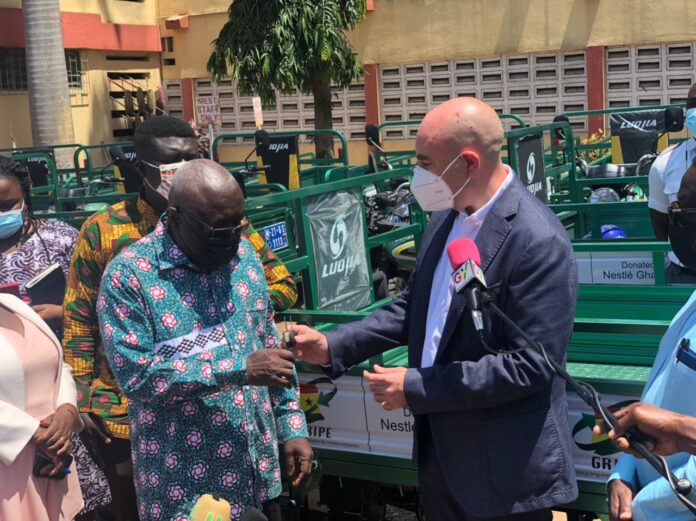
The Minister of Environment, Science, Technology and Innovation, (MESTI), Dr. Kwaku Afriyie, has hinted that government is considering a plastic waste management policy that will make it mandatory for every household to segregate their waste.
According to him, the policy is near completion and is being done in collaboration with the Ministry of Local Government and the Ministry of Sanitation and Water Resources. Already, stakeholder engagements have been factored into the legislation – which will broadly look at manufacturing, management and recycling of plastic products.
Speaking at an event to receive tricycles and other equipment donated by Nestle Ghana in support of the nation’s plastic waste fight, the minister said: “Very soon, we are coming up with some legislation to fight the indiscriminate disposal of plastic waste. We are even more concerned with the way individuals treat plastics. People sit in public transport and even their own vehicles and you see them throwing rubbish onto the street, knowing the effect of such behaviour.
“For homes, the law will demand that there is waste separation; one bin for plastics, food waste, cans etc. We tried this in the public space, but some unscrupulous people stole the bins; we are currently looking at a more sustainable means to reintroduce it.”
He added that government is contemplating the issuance of an instant fine to persons found culpable of improper disposal of waste. “We are thinking of instant fines and other ways to penalise these people. The law will demand that public transportation have a means of collecting waste so the passengers will not throw it out of the window.
“My ministry and the Ministry of Sanitation and Water Resources are seriously thinking through policies to tidy the city. We are going to fight the plastic waste head-on, in accordance with the Presidents vision to make Accra one of the cleanest cities in the sub-region; it hasn’t been easy but we are devoted to tackling it,” he added.
Nestlé Ghana
Nestlé Ghana donated 20 new tricycles, 1,060 pairs of gloves, 60 waste picking tools and overalls with reflectors to the Pure Water Waste Collectors Association, to enable the group collect more plastic for recycling.
Supported by the Ministry of Environment Science Technology and Innovation (MESTI), Nestlé and the Pure Water Waste Collectors Association signed a partnership in 2019 whereby the association would receive 20 tricycles, 1,500 waste picking tools, over 1,200 nose masks, as well as health and safety training to empower them to collect plastics in communities for recycling. This donation totals 40 tricycles donated to the Association since inception of the partnership with Nestlé Ghana.
Speaking at the handing-over ceremony, Georgios Badaro-Managing Director of Nestlé Ghana, noted that finding sustainable solutions to plastic waste requires continuous effort and strategic partnerships.
“It is important to note that the issue of plastic waste in Ghana cannot be fully resolved without strong collaboration between the private sector and government. We will continue to work with government and other stakeholders to improve collection and recycling of plastic waste. By doing this, waste collectors will be enabled economically while helping protect the environment.”
Since inception of the partnership between Nestlé and the Pure Water Waste Collectors Association, plastic waste collection has increased because of the use of tricycles to improve transportation of plastic successfully collected for recycling.
Elvis Oppong, President of the Pure Water Waste Collectors Association, shared the group’s gratitude to Nestlé and MESTI and reiterated their commitment to continue collecting and recycling more plastic waste to help save the environment.
By 2025, Nestlé commits to make its packaging 100 percent recyclable or reusable. Internally, Nestlé Ghana has eliminated all single-use plastic in its offices and provided waste bins for segregation. Earlier, in August, Nestlé Ghana planted over 100 trees in selected schools at Tema, planted 30 in its own facilities, and donated Waste segregation bins as well as handwashing stations to the schools as part of its employee volunteering programme known as ‘Nestlé Cares’.
Minister of Environment, Science, Technology and Innovation Dr. Kwaku Afriyie, left, receiving the keys from Managing Director of Nestlé Ghana, Georgios Badaro FIN









